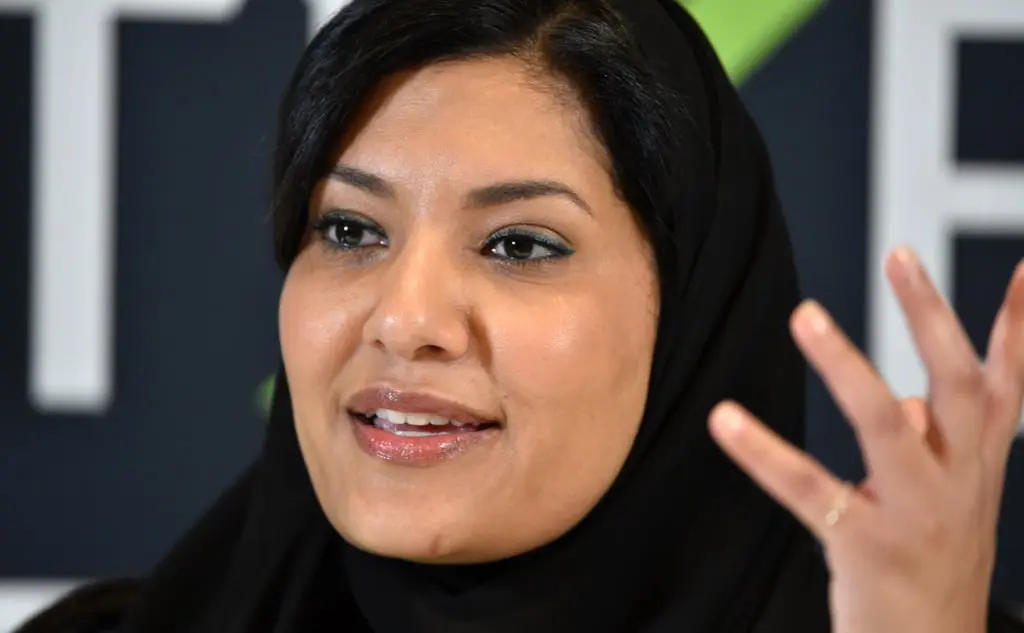Princess Reema bint Bandar al-Saud is the kingdom's ambassador to the United States. For Saudi Arabia's its their first female Ambassador, women’s empowerment is a priority throughout her career.

Princess Reema bint Bandar al-Saud became Saudi Arabia’s first female envoy on 23 February 2019, when she was appointed as the kingdom’s ambassador to the United States (US). Boasting an international education and extensive experience in the public, private and philanthropic sectors, she has made women’s empowerment a priority throughout her career.
Her appointment comes amid an international outcry over the murder of prominent Saudi critic and Washington Post columnist Jamal Khashoggi in October 2018, the Saudi-led military intervention in Yemen, and the arrests and alleged torture of Saudi women’s rights activists.
She replaces Prince Khalid bin Salman, the younger brother of the powerful Crown Prince Mohammed bin Salman (often referred to as MBS), who was appointed as vice defence minister.
Born in the Saudi capital Riyadh in 1975, Princess Reema spent most of her childhood in the United States, where her father, Bandar bin Sultan al-Saud, was the ambassador from 1983-2005. Her grandparents are Crown Prince Sultan on her paternal side and King Faisal on her maternal side, making her a direct descendant of Ibn Saud, the founder of modern Saudi Arabia, on both sides.
She attended George Washington University, graduating with a degree in museum studies. She subsequently returned to Riyadh, where she built a career in retail and management.
Throughout her career, she has sought to integrate and empower women. During her seven-year stint as CEO of Alfa International, a luxury retail company, she helped develop comprehensive training programs for female staff members. She also worked closely with the Ministry of Labour to facilitate labour market entry for women by establishing the kingdom’s first workplace nursery.
In 2013, she founded Alf Khair, a social enterprise that aims to enhance the professional capital of Saudi women through a structured curriculum focusing on professional guidance and career management.
This track record saw her appointed in 2016 as vice president of women’s affairs at the General Sports Authority, a governmental body focused on developing the Saudi sports and physical fitness space. In this position, she launched ‘10KSA’, a holistic health awareness-raising initiative with a focus on breast cancer. Her efforts included a community event that brought together more than 10,000 women in December 2015 at a football stadium in Riyadh, setting a Guinness World Record for forming the world’s largest human awareness ribbon.
She has two children with Prince Faisal bin Turki bin Nasser, to whom she was married until 2012.
As ambassador to the US, she faces hostile US lawmakers who have threatened to take tough action against Saudi Arabia over Khashoggi’s death amid claims that the crown prince was personally responsible.
“The appointment of a new envoy signifies an attempt by Riyadh to try and reset relations with Washington and draw a line under the Khashoggi affair, however unlikely that may be in practice, at least with congress,” Kristian Ulrichsen, a fellow at Rice University’s Baker Institute in the US, told The Guardian newspaper.
‘I will work with God’s permission to serve my country, its leaders and all its children, and I will spare no effort to that end,’ Princess Reema wrote on Twitter.
Although her credentials are clear, some commentators have described her appointment as a PR exercise. Bessma Momani, a professor of political science at Canada’s University of Waterloo, told al-Jazeera, “[Princess Reema] understands the [American] culture, knows how to be a valuable interlocutor, all of the qualities that you want in a diplomat, particularly in a post like the United States. But of course, I think there are many people who will see this totally as a PR exercise…. [Saudi Arabia needs] good PR, frankly. But make no mistake, she is very successful, eloquent and is deserving of the job.”
Yet her appointment will not necessarily have a major impact on US-Saudi relationships. “Right now, the US administration is strongly standing in support of MBS and the current Saudi leadership while some members of congress are increasingly calling the administration’s position into question,” Adam Coogle, Middle East Researcher for Human Rights Watch, told Fanack. “Princess Reema does play well into Saudi Arabia’s narrative that it is reforming on women’s rights, but…in my view, her appointment is more symbolic than anything as US-Saudi policymaking generally happens above the ambassador level. It’s a step in the right direction that a woman has been chosen for such a prominent role, but until Saudi Arabia abolishes the male guardianship system, Saudi women will continue to face systematic discrimination. A good place to start would be removing the travel restrictions on Saudi women.”
Princess Reema voiced a similar opinion in an interview with CNN in June 2018, after the women’s driving ban was lifted and several women’s rights activists arrested. “A lot of people ask me: Is this schizophrenic? Are you really moving forward? Is this real?” she said in the interview.
The arrests were a matter of “national security”, she said, adding that she did not want to comment further, in part because she knew the families of some of the arrested women. Regarding women’s rights, however, she went on to say, “I actually do have a family that will allow me to be mobile and dynamic, but that is not the reality for a lot of women. And until it’s the reality for a lot of women, I think we need to keep pushing forward.”


